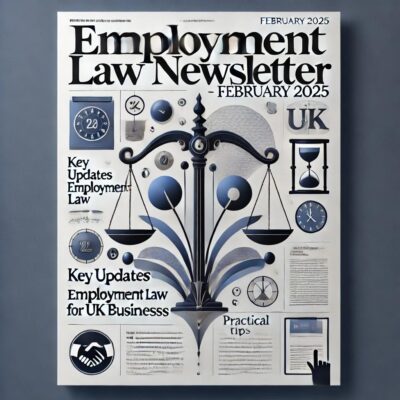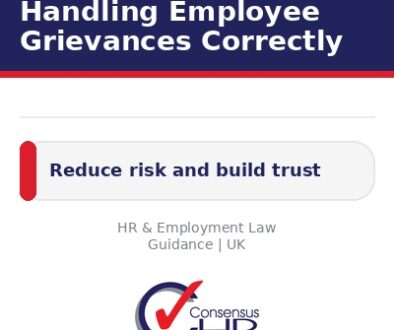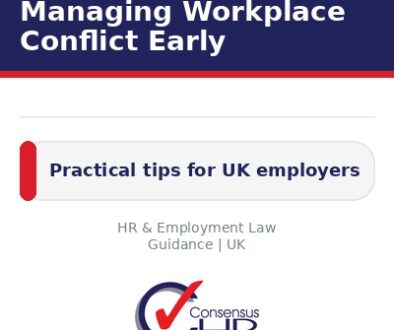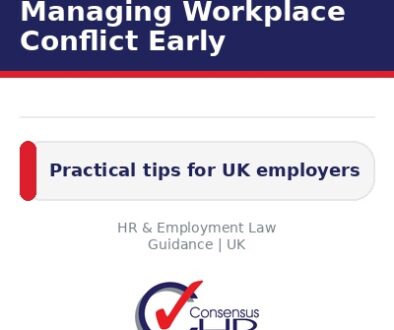Employment Law Newsletter – Jan-25 – Consensus HR in Herts & Beds

In Brief:
In Secretary of State for the Department for Environment, Food and Rural Affairs v Public and Commercial Services Union and two other cases [2024] UKSC 41, the Supreme Court overturned a Court of Appeal decision and held that a trade union was entitled, under the Contracts (Rights of Third Parties) Act 1999 to enforce a “check-off” arrangement, despite the arrangement being removed from employees’ employment contracts. A check-off is where employers deduct trade union subscriptions from the employees’ salaries and pay them directly to the union.
On 20th January 2025, the Trade Union and Labour Relations (Consolidation) Act 1992 (Amendment of Schedule A2) Order 2024 comes into force. It gives the Employment Tribunal the power to uplift or reduce an award it makes in situations where an employer has failed to inform and consult the employees’ representatives when proposing to make 20 or more redundancies (known as a Protective Award), by 25% if the employer unreasonably fails to comply with the Code of Practice on Dismissal and Re-engagement or another applicable code of practice.
Can a Court or the Employment Tribunal rectify an employment contract?
In December 2024, the Supreme Court, in the case of National Union of Rail, Maritime and Transport Workers and another v Tyne and Wear Passenger Transport Executive (trading as Nexus) [2024] UKSC 37, considered what happens if the written record of a collective agreement, by mistake, does not accurately reflect what the employer and the union representatives agreed.
The reason for clarifying this issue is that unless expressly stated to be so, Collective Agreements reached through collective bargaining between an employer and a recognised trade union are not legally enforceable contracts. However, through express words, custom or practice, terms of collective agreements dealing with pay and conditions are often incorporated in individual employment contracts.
If a contract is legally enforceable and a mistake has been made concerning its terms, the Court can rectify it. The questions before the Supreme Court were:
- Can the Court rectify a contract that is not legally enforceable?
- If a mistake is made in recording terms of a Collective Agreement, can contracts of employment which incorporate those terms be rectified?
- If rectification is possible, who should the parties to the claim for rectification be? And must any such claim be made in the High Court, or can the relevant question be decided by an employment tribunal?
If a document inaccurately records the terms of a contract, a Court may rectify it
The Supreme Court ruled unanimously that a collective agreement which is incorporated into the employment contracts of individual workers may be corrected even if the collective agreement was presumed by the parties not to be legally enforceable. The Court also held that it is not necessary, if a relevant mistake is alleged to have been made in the drafting of such a collective agreement, to ask for rectification on the individual contracts of employment. Regarding whom the proper Defendants to such an action are, the Court concluded that the individual workers whose legal rights are affected, are the rightful Claimants.
Dismissal of autistic employee justified after she sent a series of abusive emails to colleagues
In Kaler v Insights ESC Limited, the Employment Appeal Tribunal (EAT) was asked to rule on whether a teacher who had been dismissed for sending numerous abusive emails to her colleagues, had been subjected to discrimination arising from her disability, namely autism.
The Claimant, K, worked for a school that instructed children with social, emotional, behavioural, and mental health needs. When K was first engaged by the school as a supply teacher in March 2013, she shared with the school’s Principal that she was “going through the process of being diagnosed” with Asperger’s syndrome and that she considered herself to be disabled.
K left the school in June 2013, following a disagreement with a colleague, and did not start working for the school again until January 2017. She was open about her autism and described herself as an ‘aspie.’
In January 2018, K was dismissed for gross misconduct after sending a substantial number of abusive, threatening, and harassing emails to colleagues. The emails concerned issues regarding her salary. Some of the emails were sent to all staff members, and she refused to stop the barrage even after she was told to do so. She also sent sexually inappropriate texts to a colleague.
Following her dismissal, K brought the following claims in the Employment Tribunal:
- direct disability discrimination,
- discrimination for reasons arising from a disability, and
- failure to make reasonable adjustments. The Employment Appeals Tribunal (EAT) disagreed with the Tribunal’s finding that the Principal could not be expected to remember an email from three and a half years ago from an employee stating they believed they had autism. The reference K made to being an “aspie” in her most recent employment was enough to put the Principal on notice regarding K’s possible disability.
K argued that her autism left her prone to having “meltdowns.” The Employment Tribunal first had to decide whether the Principal knew or ought to have known about K’s disability (referred to as Constructive Knowledge). It held that it was unreasonable to expect the Principal to remember K’s comment made in 2013, namely that she was “going through the process of being diagnosed” with Asperger’s syndrome. K’s reference to being an ‘aspie’ was also not enough to establish Constructive Knowledge.
The EAT disagreed, stating that the evidence presented by K regarding her 2013 comments and referring to herself as an ‘aspie’ were enough to put the Principal “on notice” that K had a disability. However, the EAT upheld the Tribunal’s finding that, regardless of any disability, K’s conduct was so bad and serious that dismissing her was both justified and proportional.
This newsletter does not provide a full statement of the law and readers are advise to take legal advice before taking any action based on the information contained herein’.
Why Choose Consensus HR?
At Consensus HR, we pride ourselves on offering practical, jargon-free HR support tailored to your business. Our retained services are designed to provide the flexibility, expertise, and peace of mind you need to manage your workforce effectively and stay compliant with UK employment law.




